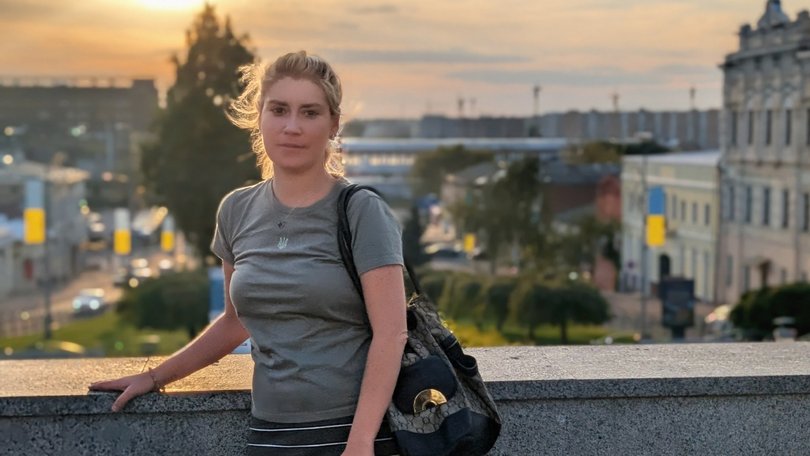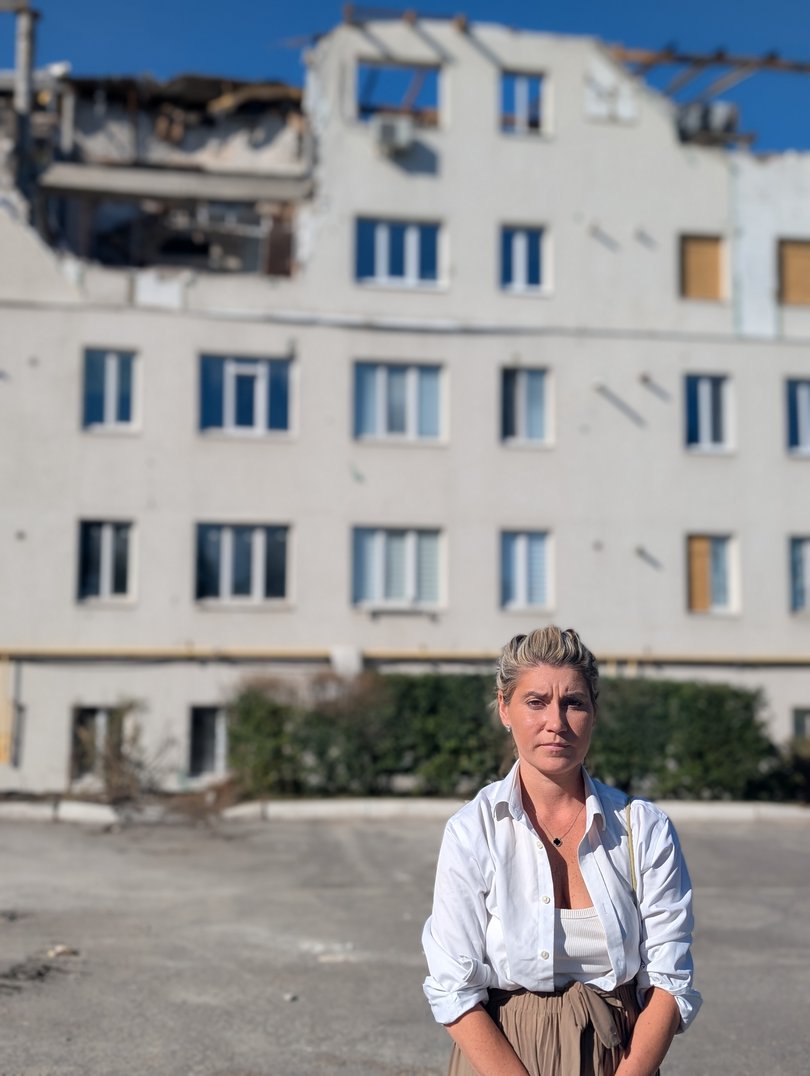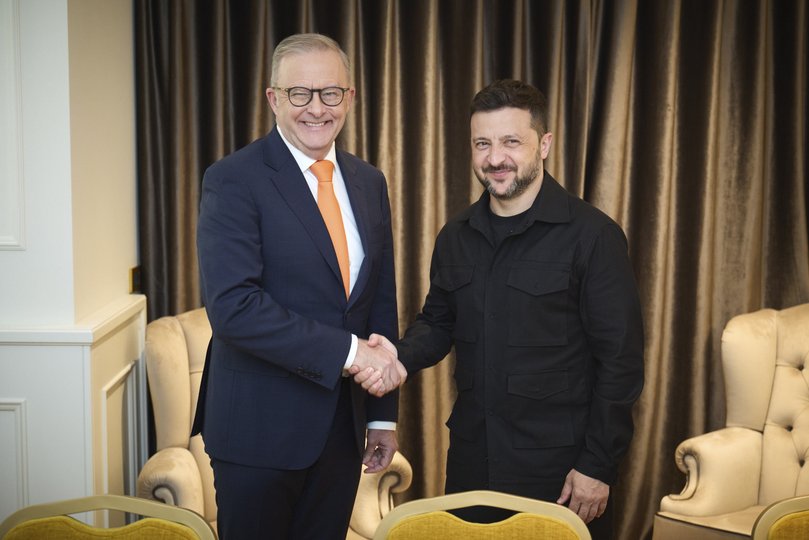Kharkiv, Ukraine: Imogen Payter reveals why she’s proud Russia’s Vladimir Putin sanctioned her
Sanctioned by Putin, this Australian in Kharkiv explains why she’s unafraid of the Russian President and heading straight back to the frontline.

Imogen Payter is navigating her way through central Kharkiv, in northeastern Ukraine. It’s a potentially deadly task.
An air-raid siren sounded minutes earlier, warning that a Russian KAB missile was on its way.
In Kyiv, some 300 kilometres away from the Russian border, it is a little easier to ignore the alerts or at least prepare for them and seek a bomb shelter.
Sign up to The Nightly's newsletters.
Get the first look at the digital newspaper, curated daily stories and breaking headlines delivered to your inbox.
By continuing you agree to our Terms and Privacy Policy.But here in Kharkiv, just 30 kilometres from the border where Russia unleashes its swarms of drones and missiles, by the time an air-raid has sounded, whatever weapon Vladimir Putin has sent to kill innocent Ukrainians that hour is usually already well on its way or can even have bombed its target.
Every minute counts, more than usual, even for Ukraine.
Kharkiv, Ukraine’s second-largest city, was once known as a hip, clean and green sprawling university city. Now, its reputation is as one of the most dangerous non-occupied places to visit since the full-scale invasion of February 2022.
An overhead missile or drone also means there’s no GPS. The Ukrainians jam the signal anytime Russia deploys its unmanned drones across Kharkiv’s skies.
Which makes getting to Ms Payter’s scheduled 11am meeting difficult. The KAB is on its way, there’s no GPS, and it’s a frantic calculation as to whether or not to seek shelter in the metro station or continue to the meeting.
In the end, she decides to press ahead to meet a local official, who is keen to show her his rebuilt rooftop office that was hit by a Russian missile last year. As the tour is taking place, the Russian KAB missile lands on top of Kharkiv’s Pharmaceutical University, injuring four.
When she looks up the location of the hit a short time later, she realises she was about six minutes away from the strike, thanks to the endless loops around the city trying to find her meeting spot without being able to use Google Maps.
It is this sort of sliding-door moment that terrifies her mother, who lives in Sydney’s Lower North Shore.
“I was frightened this morning,” Ms Payter admits, in an interview with The Nightly later that day.
“But it would never deter me — I can’t be more frightened than the Ukrainians who are dealing with this day in, day out.
“I think it would be a bit self-indulgent to be frightened, given that I have the opportunity to leave.”
Ms Payter first travelled to Ukraine in 2019, before what Ukrainians call the “Big War” began.
When Mr Putin sent his tanks Kyiv’s way in February 2022, Ms Payter’s immediate instinct was to help.

As a Parliamentary Assistant in the House of Commons for a Conservative MP, she tapped her political network, which spans across all the major parties, and began organising aid convoys and then established her NGO UK Friends of Ukraine and began taking regular delegations of British MPs to visit Ukrainian contacts, including in the military and on the battlefield.
“I’ve been under mass missile attack in Odessa, shellings, drones, in February, when we had our parliamentary delegation,” Ms Payter recalls.
“Luckily, the drone was shot down, but that didn’t stop the debris from falling just on the corner of the street of the hotel we were in.
“On the front lines of Kherson, when you enter, it’s black smoke, it’s shelling, and then you deliver the aid and you’re walking into a room full of children, having a watermelon party, and you forget about where you are.
“It’s part and parcel of the role I do, but as I said, I don’t have to go through this every night.
“I don’t have the sleepless nights of air raids and drone missile attacks that the Ukrainians do.”
On this visit, Ms Payter will have clocked around two dozen of these sorts of trips to Ukraine.
Asked why she keeps tempting fate, she jokes that the question sounds like it’s coming from her mother, but says with seriousness, that it has never once occurred to her to stop, despite the danger.
“I enjoy the people I get to help,” she said.
“I enjoy the Ukrainians I meet and hearing the stories of their sheer determination.
“I think that is always a risk of going to war, and it’s one I’ve made a judgment on, that the amount of reward I feel like I personally get out of my work, and hopefully the help that is provided to Ukraine through my work, that it’s worth that risk.”
Those risks have been noticed in the Kremlin.
Last month, Russia’s Ministry of Foreign Affairs singled out the Australian in a list of “British nationals and third-country nationals” who it accused of “collaborating with destructive British media and consulting agencies.”
The Russian Government sanctioned her and barred her from entering Russia.
“Thank you, Putin!” Ms Payter says, with a wide grin, when the sanction is raised.
“I did actually have a small internal celebration when I saw that. I thought it was a good middle finger up to him.”
She believes it is proof that her work is having an impact, and asked how it made her feel, she said: “Proud of myself.”
“It also made me proud of my team and the fact that the work we’re doing is obviously reaching both the right and the wrong people like that,” she said.
“That they see that truth sharing as a threat because it goes to show everything they stand for, and that is disinformation, it is dishonesty, and they’re the aggressors, why should they not be called out on that?”
But as a dual Australian-British citizen, Ms Payter says there is one area where she feels less pride — and that is constantly turning up in Ukraine to see so few Australians.
Ms Payter took 19 Members of the Houses of Commons and Lords to Kyiv for the annual Yalta European Strategy Conference on the weekend.
Like the UK’s Foreign Secretary Yvette Cooper and national security adviser Jonathan Powell, the British representatives all defied their Government’s Do Not Travel warning to visit Ukraine and observe how to further support the country’s fight against Russia.
By contrast, not a single sitting MP or government representative or official attended for Australia.

Ms Payter says it’s an all-too common experience to be in Ukraine and see no one from the Australian Government in rooms filled with other international figures.
“We have had some big names visit recently, but it’s also very sporadic and in terms of volume, very little,” Ms Payter says, of Australia’s contributions to Ukraine.
“It’s disappointing, I think we could be doing a lot more to engage with the Ukrainians from the Australian side.
“Because I think they’re missing out on an opportunity for that engagement, but also to represent what Australians are about, and that is we’re little Aussie battlers and the Ukrainians are battling now.
“One of my favourite stories was explaining to a good friend, a Ukrainian friend of mine, who lives in Odessa in Kyiv, Mykyta, who loved to hear the story behind our Coat of Arms, the emu and the kangaroo, and that they never go backwards.
“And he said: ‘Yes, just like Ukraine!’ and I think that sums it up.
“They’re fighters, they’re battlers, and they’re strong, and I think that represents Australians as well.”
Australia announced on Wednesday that it was joining UK, EU, Japan and New Zealand in lowering the cap on the price of Russian oil from $US60 ($90) per barrel to $US47.60 ($70).
The price cap is aimed at constraining Russia’s crude oil market.
Whilst Australia is to reveal what contribution it will make to the Coalition of the Willing’s reassurance force to be deployed to Ukraine after any ceasefire, Labor has not announced any new military support for Ukraine in a year.
Both Prime Minister Anthony Albanese and Ukraine’s President Volodymyr Zelensky are due to attend the United Nations General Assembly in New York next week.
They met in Rome on the sidelines of the Pope’s inauguration mass shortly after Mr Albanese’s re-election.

